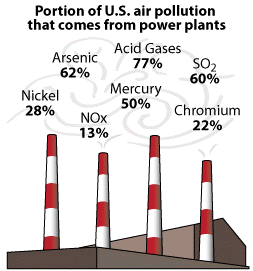
Five things you should know about the Trump Administrations latest assault on the Mercury and Air Toxics Standards
In 1990, while I was busy with kid priorities like learning to roller-skate, Congress was updating the Clean Air Act – kicking off a process to reduce mercury and other air toxic air pollution from coal-fired power plants.
Fast-forward several decades to 2012, the year my first daughter was born, and we finally had the Mercury and Air Toxics Standards in effect.
Unfortunately, after that 20-year journey to get strong protections against mercury pollution, the Trump Administration is now trying to move us backward.
Trump’s Acting Environmental Protection Agency (EPA) Administrator Andrew Wheeler has confirmed that he’s “reconsidering” the legal foundation of the Mercury and Air Toxics Standards – a move that could allow him to topple our national safeguards against the pollution linked to cancer, lung disease, and brain damage in babies.
What’s worse, Wheeler proudly announced the move on National Child Health Day.
Here are five things you should know about the Mercury and Air Toxics Standards – and Wheeler’s assault against them:
- Coal-fired power plants emit at least 84 separate hazardous air pollutants
EPA is required by law to reduce hazardous air pollution – thanks to the bipartisan Clean Air Act Amendments of 1990. Power plants were the leading source of many toxic pollutants, including mercury and arsenic, before the Mercury and Air Toxics Standards went into effect.

The Mercury and Air Toxics Standards are now fully implemented and are successfully reducing American families’ exposure to:
- Mercury, which causes brain damage in babies
- Arsenic, which can cause cancer
- Lead, which can damage children’s developing nervous system
- Chromium and nickel, which cause cancer
- Acid gases, which cause serious lung disease
- And other poisonous substances in our air.
- Rolling back the Mercury and Air Toxics Standards will mean more death and disease
The mercury from coal plant smokestacks contributes to localized pollution hot spots, and also blows into downwind states where it contaminates lakes and rivers – and, in turn, the fish we eat. Mercury contamination in fish spans lakes and rivers across all regions of the U.S.
Hundreds of thousands of American newborns still face the risk of learning disabilities or worse due to prenatal exposure to mercury, and pregnant women are still routinely warned not to eat certain kinds of fish because of the high levels of mercury in our waters.
Mercury pollution can also disproportionately impact certain groups, including low-income and minority communities and subsistence fishers. Native Americans, for example, often eat up to 20 times more fish than the general U.S. population.
Thanks to the Mercury and Air Toxics Standards, we are starting to see progress. According to a recent study, mercury levels in Atlantic Bluefin tuna are now rapidly declining due to a shift away from burning coal. Rolling back the standards would reverse that progress.
The Mercury and Air Toxics Standards help ensure 90 percent of the mercury in coal burned in power plants is not released into our air.
EPA estimates the Mercury and Air Toxics Standards:
- Save up to 11,000 lives each year
- Prevent thousands of heart attacks each year
- Prevent thousands of asthma attacks each year
- Prevent thousands of hospital and emergency room visits each year
The economic benefits of the Mercury and Air Toxics Standards are as high as $90 billion each year, outweighing the costs by up to a margin of 9-to-1.
- Virtually no one supports rolling back the Mercury and Air Toxics Standards
In 2011, more than 800,000 people sent comments to EPA supporting strong mercury standards.
States, mayors, public health groups and medical associations, environmental groups, faith groups, small business groups, the NAACP, moms, scientists, sportsmen, and Voces Verdes have all spoken up in support of the Mercury and Air Toxics Standards.
In the last few months, everyone – from industry and labor leaders to Members of Congress from both parties – have asked the Trump administration to leave the standards in place:
- A group of industry and labor leaders – including the Edison Electric Institute; the American Public Power Association; the National Rural Electric Cooperative Association; the International Brotherhood of Electrical Workers; and the International Brotherhood of Boilermakers, Iron Ship Builders, Blacksmiths, Forgers and Helpers – sent a letter to EPA in July asking the agency leave the Mercury and Air Toxics Standards “in place and effective”
- Senators Tom Carper (D-DE) and Lamar Alexander (R-TN) recently sent a letter to EPA asking the agency not to change the standards
A rollback of these standards will benefit no one except perhaps a few coal barons. Wheeler was a lobbyist for coal baron Bob Murray before being appointed to head EPA. Murray has identified eliminating our protections against mercury pollution as a top priority of his.
- The power sector is already meeting the Mercury and Air Toxics Standards
In a filing with the U.S. District Court for the D.C. Circuit last year, power companies supporting the Mercury and Air Toxics Standards said:
“Electric generators have based their investment decisions and price predictions on the expectation that the Standards would remain in effect.”
Most major power companies have already complied with the Mercury and Air Toxics Standards, and for a fraction of their original estimated cost. FirstEnergy, for example, initially estimated up to $3 billion to comply, but their final estimated compliance cost has now dropped to $345 million.
An analysis released earlier this year found that between 2014 and 2016 reported coal plant mercury emissions declined 69 percent. Rolling back the Mercury and Air Toxics Standards could jeopardize that progress and put communities at risk.
- This is the latest in a long line of Trump administration attacks on public health
Wheeler’s reconsideration of the underpinnings of the Mercury and Air Toxics Standards marks the sixth time in two months that the Trump administration has chosen special interests over public health and the environment.
It follows the proposed (and widely opposed) rollbacks of the Clean Car Standards, the Clean Power Plan, and EPA’s standards for pollution from oil and gas drilling; a final determination to rollback BLM’s standards to prevent the waste of natural gas on public and tribal lands; and the denial of petitions from Maryland and Delaware asking for help with smog caused by pollution from upwind states.
Unraveling just two of those protections – undermining the Mercury and Air Toxics Standards and adopting the Clean Power Plan “ACE” replacement – means about 12,000 more deaths every year, but the Trump administration is determined to plow ahead anyway.
Rolling back the Mercury and Air Toxics Standards will burden Americans with more air pollution, asthma attacks, and early deaths.
It has taken decades of work to start reducing mercury and other toxic pollution in our air. My daughter is nearly six years old now, and this latest Trump administration maneuver could mean she and millions of other children all across America are exposed to more toxic mercury, acid gases, and soot.
It is time, yet again, for Americans to raise their voices for protections against toxic power pollution.













One Comment
While I fully support the Mercury and Air Toxics Standards we wish to point out that there is no compelling evidence to support the idea that methyl mercury levels found in oceanic fish such as bluefin tuna is connected to anthropogenic sources. The current theory is that mercury found in the tissue of oceanic species comes from hydrothermal vents in deep ocean.